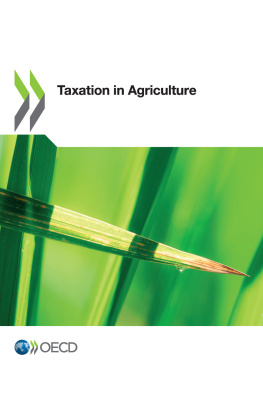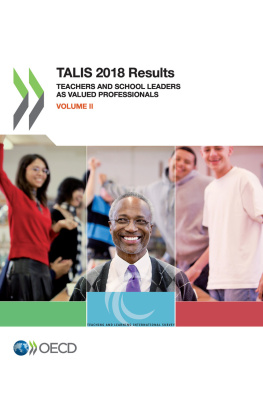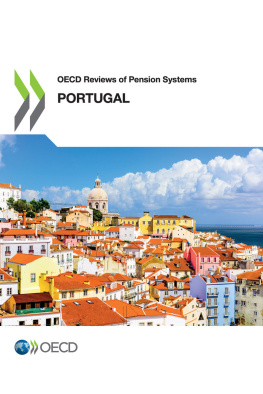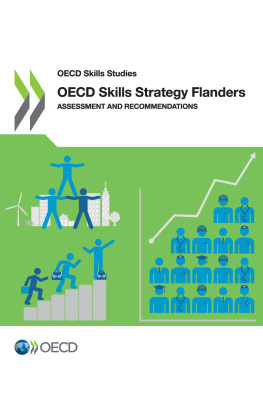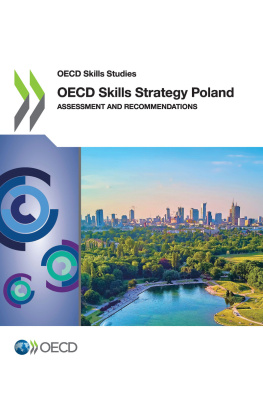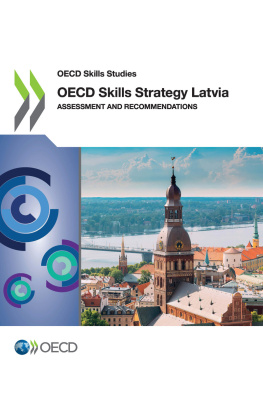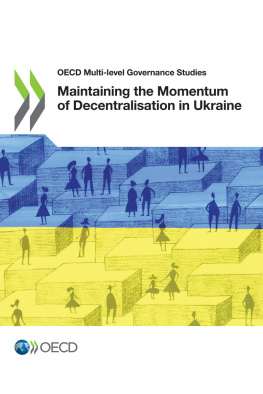OECD - Decentralisation and Regionalisation in Portugal
Here you can read online OECD - Decentralisation and Regionalisation in Portugal full text of the book (entire story) in english for free. Download pdf and epub, get meaning, cover and reviews about this ebook. year: 2020, publisher: OECD Publishing, genre: Politics. Description of the work, (preface) as well as reviews are available. Best literature library LitArk.com created for fans of good reading and offers a wide selection of genres:
Romance novel
Science fiction
Adventure
Detective
Science
History
Home and family
Prose
Art
Politics
Computer
Non-fiction
Religion
Business
Children
Humor
Choose a favorite category and find really read worthwhile books. Enjoy immersion in the world of imagination, feel the emotions of the characters or learn something new for yourself, make an fascinating discovery.
Decentralisation and Regionalisation in Portugal: summary, description and annotation
We offer to read an annotation, description, summary or preface (depends on what the author of the book "Decentralisation and Regionalisation in Portugal" wrote himself). If you haven't found the necessary information about the book — write in the comments, we will try to find it.
OECD: author's other books
Who wrote Decentralisation and Regionalisation in Portugal? Find out the surname, the name of the author of the book and a list of all author's works by series.
Decentralisation and Regionalisation in Portugal — read online for free the complete book (whole text) full work
Below is the text of the book, divided by pages. System saving the place of the last page read, allows you to conveniently read the book "Decentralisation and Regionalisation in Portugal" online for free, without having to search again every time where you left off. Put a bookmark, and you can go to the page where you finished reading at any time.
Font size:
Interval:
Bookmark:
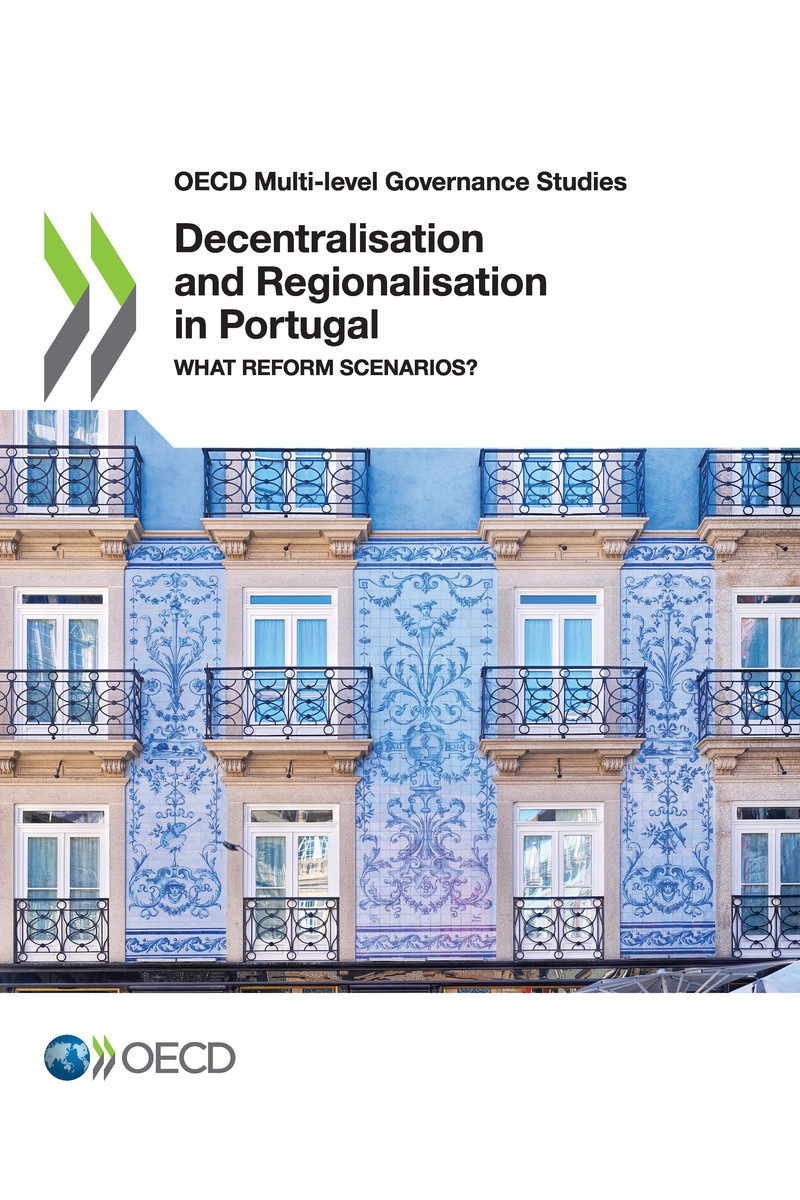
OECD (2020), Decentralisation and Regionalisation in Portugal: What Reform Scenarios? , OECD Multi-level Governance Studies, OECD Publishing, Paris, https://doi.org/10.1787/fea62108-en .
The information in this document with reference to Cyprus relates to the southern part of the Island. There is no single authority representing both Turkish and Greek Cypriot people on the Island. Turkey recognises the Turkish Republic of Northern Cyprus (TRNC). Until a lasting and equitable solution is found within the context of the United Nations, Turkey shall preserve its position concerning the Cyprus issue.
The Republic of Cyprus is recognised by all members of the United Nations with the exception of Turkey. The information in this document relates to the area under the effective control of the Government of the Republic of Cyprus.
From an OECD comparative perspective, Portugal is a unitary and much centralised State, clearly influenced by the model of public administration. Portugal has basically only two layers of government, with the exception of the two autonomous regions of Madeira and Azores, of which the 308 municipalities form the core of the local government. The creation of administrative regions in the Continental territory of Portugal, which is contemplated in the Portuguese Constitution of 1976, has never materialised. A referendum on regionalisation failed in 1998. Two decades later, the Portuguese government continues to face recurrent challenges of economic development and territorial cohesion. Recently, decentralisation reforms emerged again on top of the policy agenda with two main objectives: by assigning more tasks to municipalities and by strengthening regional level governance.
The OECD has prepared this report upon request by the Portuguese Autonomous Parliamentary Commission of Decentralisation. The aim of the report is to present alternative ways forward for Portugal to implement its regionalisation reforms, in the broader context of decentralisation trends. The paper utilises analysis of present international trends on decentralisation and regionalisation, notably the expected effects of these reforms and the conditions under which they may deliver more economic efficiency and regional equity.
The report presents three potential policy paths of regional reform for Portugal: i) Decentralisation and strengthened deconcentration without empowerment of regional level; ii) Decentralisation without full regionalisation by reinforced municipal and inter-municipal levels; and, iii) Decentralisation through complementary regionalisation and inter-municipal cooperation reforms. These options are presented from the least to the most comprehensive one. As the options are not mutually exclusive, they could be seen as different layers of an incremental and medium- to long-term structural reform agenda.
The report is part of the OECD Multi-Level Governance Studies series. It was conducted by the OECD Centre for Entrepreneurship, SMEs, Regions and Cities (CFE), under the leadership of the Regional Development Policy Committee. It was approved on 4th November 2019 by written approval procedure under the reference [CFE/RDPC(2019)9].
This report was produced by the OECD Centre for Entrepreneurship, SMEs, Regions and Cities (CFE) led by Lamia Kamal-Chaoui, Director. It is part of the multi-level governance Programme of Work of the OECDs Regional Development Policy Committee.
The report was coordinated and written by Antti Moisio, Economist/Policy Analyst, with substantial contributions received from Anna Rubin, Isabelle Chatry, Antoine Kornprobst, Louise Phung and Enrique Garzilazo from the OECD Secretariat. It was prepared under the supervision of Dorothe Allain-Dupr, Head of Unit, Decentralisation, Public Investment and Subnational Finance. This unit is in the Economic Analysis, Statistics and Multi-level Governance Section, led by Rudiger Ahrend, in CFE. The report also includes substantial contributions from Romain Pasquier, Professor and Director of Research at the CNRS; and Linda Veiga, Professor of Economics, University of Minho. The overall project was directed by Joaquim Oliveira Martins, Deputy Director in CFE. In the context of the project, a fact finding mission was organised in Portugal in April 2019, and a seminar was organised in Porto in April 2019. The OECD would like to thank Isabel Flores, General Secretary at IPPS-ISCTE, and Raul Lopes, Professor at ISCTE-IUL, for the coordination of the local team, and for Srgio Nunes and Antnio Mendes Baptista for their input in the local team. The OECD would also like to thank the two international peer reviewers, Mr Jani Pitkniemi, Director General, Ministry of Finance, Department for Local Government and Regional Administration, Finland, and Mr Pawe Chory, Managing Director, Polish Development and Promotional Bank, Poland, who attended the seminar arranged in Porto in April 2019 and gave their valuable insights on regional reforms in their countries. Finally, the OECD would like to thank Mr Joo Cravinho and Professor Joo Ferro as well as Mr Duarte Rodrigues for support and very helpful discussions.
The authors gratefully acknowledge the comments and input received from the Delegates of the OECD Regional Development Policy Committee throughout the process. Thanks are also due to Eleonore Morena for editing and formatting the manuscript and to Pilar Philip who prepared the final publication.
The purpose of this report is to present international and OECD trends on both decentralisation and regionalisation, and to discuss the expected effects of these reforms and the conditions under which they may deliver more economic efficiency and regional equity. The study is based both on economic research and best policy practices. This analysis and information can be useful to contribute to the current policy debate in Portugal about decentralisation and regionalisation.
Font size:
Interval:
Bookmark:
Similar books «Decentralisation and Regionalisation in Portugal»
Look at similar books to Decentralisation and Regionalisation in Portugal. We have selected literature similar in name and meaning in the hope of providing readers with more options to find new, interesting, not yet read works.
Discussion, reviews of the book Decentralisation and Regionalisation in Portugal and just readers' own opinions. Leave your comments, write what you think about the work, its meaning or the main characters. Specify what exactly you liked and what you didn't like, and why you think so.





